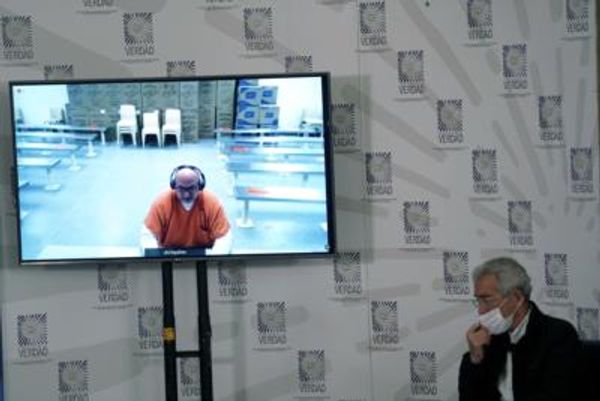Elon Musk showcased his company Neuralink's progress on brain-implant technology during an event livestreamed from the firm's headquarters in Fremont, California, on Wednesday night.
Driving the news: The Neuralink co-founder emphasized that the event's goal was to recruit talent, but Musk highlighted a video of a monkey called Sake that had a brain implant conducting an exercise he described as "telepathic typing."
- "To be clear, he's not actually using a keyboard," Musk said. "He's moving the cursor with his mind to the highlighted key. Now technically, he can't actually spell. So I don't wanna oversell this thing, because that's the next version."
What they're saying: Neuralink states that it aims to help people with paralysis "regain independence through the control of computers and mobile devices."
- Musk has said a key goal is to one day effectively treat brain disorders with a chip. "Even if we do not succeed with that problem, we are confident at this point that we will succeed at solving many brain injury issues–spine injury issues–along the way," Musk said on Wednesday night.
- He also said Neuralink would aim to restore vision in people, even if they're born blind.
The intrigue: "We want to be extremely careful and certain that it will work well before putting a device into a human, but we've submitted, I think, most of our paperwork to the FDA and we think probably in about six months we should be able to have our first Neuralink in a human," Musk said.
Worth noting: Musk said in 2019 that he "aspirationally" hoped to start trials on directly connecting people's brains to computers the following year as he announced that a monkey had been able to control a computer with its brain.
- CNN notes that Musk "frequently touts deadlines that don't come to fruition, from his claims about when SpaceX would get its Mars rocket to space to his predictions about when self-driving cars would be on the road."
The big picture: CNN points out that scientists have been working on "devices that can decode brain signals for a practical purpose for decades."
- A study by European researchers earlier this year announced that a fully paralyzed patient with ALS, or Lou Gehrig's disease, had regained his ability to communicate via a new brain implant.
- Last year, Brown University announced that "using a brain-computer interface, a clinical trial participant was able to create text on a computer at a rate of 90 characters per minute just by thinking about the movements involved in writing by hand."
Between the lines: Daniel Yoshor, a neurosurgeon and neuroscientist at the University of Pennsylvania who's worked with similar technology, told the New York Times after the Neuralink demo that the firm's hardware was impressive, "but does not represent a dramatic advance in restoring or enhancing brain function."
- Yoshor said to the NYT he "would be highly unsure of this kind of device in a patient with congenital blindness."
- The researcher also cast doubt on Musk's claim that he was "confident that it is possible to restore full body functionality to someone who has a severed spinal cord."
What we're watching: University of Colorado neuroscience professor Cristin Welle told the NYT the FDA's biggest concern for testing the implant in humans would be the safety aspect and whether it could "present unreasonable risks to patients" or cause brain damage.
- Durability would be another key consideration, added Welle, who assisted in the drafting of FDA brain-computer implants guidance before leaving the agency in 2016.
- Representatives for the FDA declined to comment.
Go deeper: Elon Musk's Neuralink wants to read your brain
Editor's note: This article has been updated with more comment from Musk, the FDA and further context.







